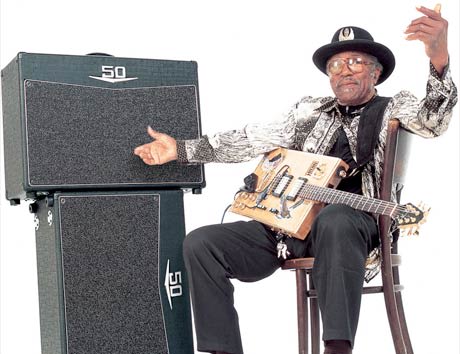Bo Diddley, one of the true fathers of rocknroll, died today in his Florida home. He was 79.
After months of illness, the influential guitar player/songwriter succumbed to heart failure, his publicist said in a statement. Diddley suffered a heart attack last August, only three months after having a stroke while touring Iowa. At the time of his death, he was undergoing rehabilitation in Florida.
While Diddley scored few hits during his 40 some years of recording, his impact on rocknroll is immeasurable. The maraca-driven sound he introduced in his 1955 track "Bo Diddley became what Rolling Stone dubbed "the most plagiarised rhythm of the 20th century.
The "Bo Diddley Beat, a syncopated 5/4 pattern similar to the "hambone rhythm, became the backbone of such songs as Buddy Holly's "Not Fade Away, the Strangeloves' "I Want Candy, the Who's "Magic Bus, the Stooges "1969 and Bruce Springsteen's "She's the One.
The Rolling Stones also often lifted Diddleys beat. "We did it with a Bo Diddley beat, which at the time was very avant-garde for a white band to be playing Bo Diddley's stuff, Rolling Stones drummer Charlie Watts told Bloomberg. "It was a very popular rhythm for us in clubs.
Along with crafting his signature beat, Diddley was also one of the pioneers of the electric guitar, pushing its sound forward rhythmically and by adding reverb, tremolo and other sound manipulations. "He treats it like it was a drum, very rhythmic," E. Michael Harrington, a music professor at Belmont University in Nashville, Tenn., said in 2006.
In turn, Diddleys pioneering efforts eventually landed him a spot in the Rock and Roll Hall of Fame, a star on Hollywood's Walk of Fame and a Grammy Lifetime Achievement Award, and let us not forget, a Nike advertising campaign backing pro athlete Bo Jackson (see video below), among other honours. Yet, as he once pointed out too the Associated Press, "it didn't put no figures in my checkbook. If you ain't got no money, ain't nobody calls you honey."
Yet throughout the years, Diddley never seemed one to equal money with success, frequently showing he more than happy with his place in the world. "I came out of school and made something out of myself. I am known all over the globe, all over the world. There are guys who have done a lot of things that don't have the same impact that I had."
After months of illness, the influential guitar player/songwriter succumbed to heart failure, his publicist said in a statement. Diddley suffered a heart attack last August, only three months after having a stroke while touring Iowa. At the time of his death, he was undergoing rehabilitation in Florida.
While Diddley scored few hits during his 40 some years of recording, his impact on rocknroll is immeasurable. The maraca-driven sound he introduced in his 1955 track "Bo Diddley became what Rolling Stone dubbed "the most plagiarised rhythm of the 20th century.
The "Bo Diddley Beat, a syncopated 5/4 pattern similar to the "hambone rhythm, became the backbone of such songs as Buddy Holly's "Not Fade Away, the Strangeloves' "I Want Candy, the Who's "Magic Bus, the Stooges "1969 and Bruce Springsteen's "She's the One.
The Rolling Stones also often lifted Diddleys beat. "We did it with a Bo Diddley beat, which at the time was very avant-garde for a white band to be playing Bo Diddley's stuff, Rolling Stones drummer Charlie Watts told Bloomberg. "It was a very popular rhythm for us in clubs.
Along with crafting his signature beat, Diddley was also one of the pioneers of the electric guitar, pushing its sound forward rhythmically and by adding reverb, tremolo and other sound manipulations. "He treats it like it was a drum, very rhythmic," E. Michael Harrington, a music professor at Belmont University in Nashville, Tenn., said in 2006.
In turn, Diddleys pioneering efforts eventually landed him a spot in the Rock and Roll Hall of Fame, a star on Hollywood's Walk of Fame and a Grammy Lifetime Achievement Award, and let us not forget, a Nike advertising campaign backing pro athlete Bo Jackson (see video below), among other honours. Yet, as he once pointed out too the Associated Press, "it didn't put no figures in my checkbook. If you ain't got no money, ain't nobody calls you honey."
Yet throughout the years, Diddley never seemed one to equal money with success, frequently showing he more than happy with his place in the world. "I came out of school and made something out of myself. I am known all over the globe, all over the world. There are guys who have done a lot of things that don't have the same impact that I had."
